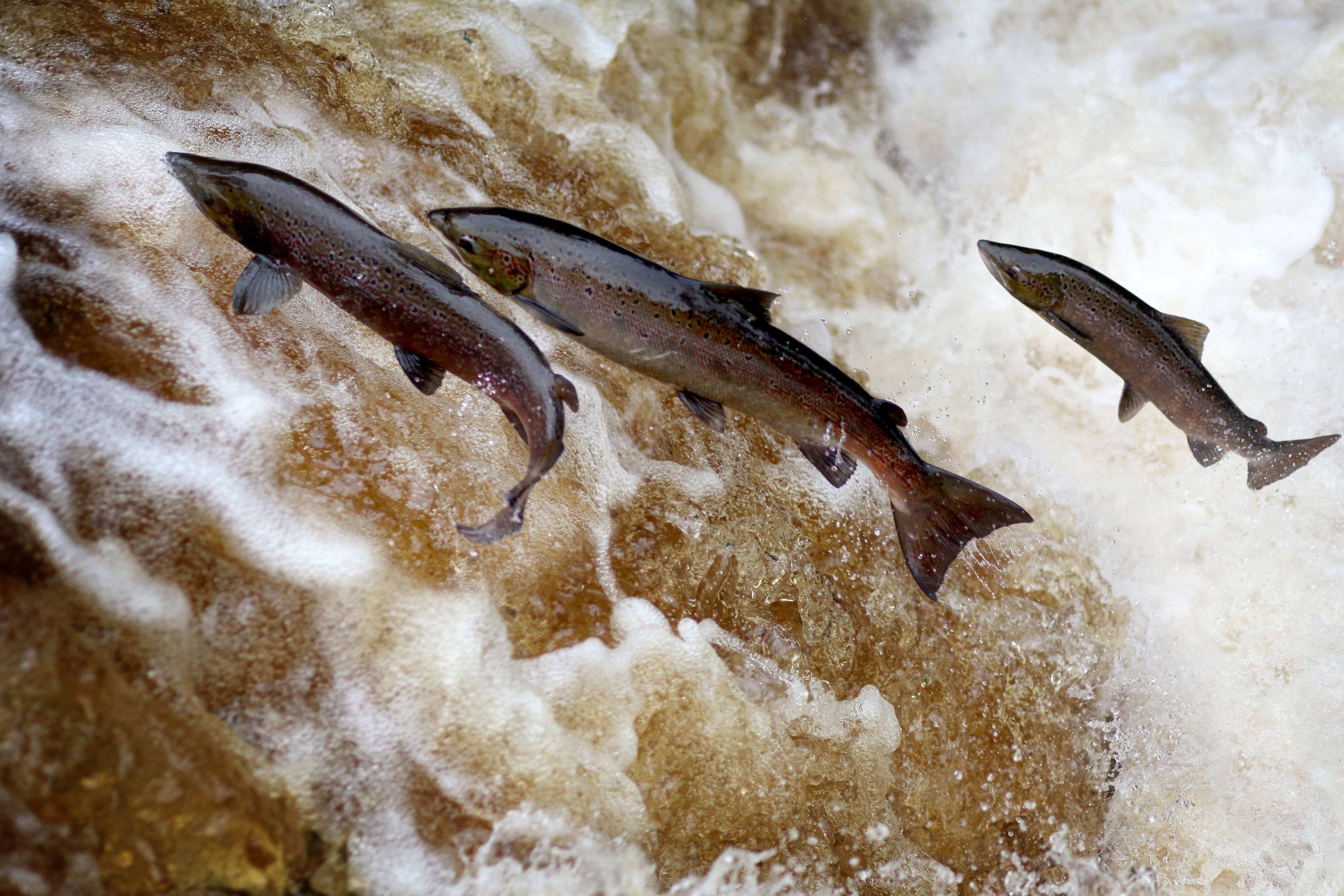Salmon stocks at lowest levels on record in England’s rivers, report warns
Report shows 90% of English salmon rivers and all of those in Wales have fish numbers below minimum sustainable levels.

Your support helps us to tell the story
From reproductive rights to climate change to Big Tech, The Independent is on the ground when the story is developing. Whether it's investigating the financials of Elon Musk's pro-Trump PAC or producing our latest documentary, 'The A Word', which shines a light on the American women fighting for reproductive rights, we know how important it is to parse out the facts from the messaging.
At such a critical moment in US history, we need reporters on the ground. Your donation allows us to keep sending journalists to speak to both sides of the story.
The Independent is trusted by Americans across the entire political spectrum. And unlike many other quality news outlets, we choose not to lock Americans out of our reporting and analysis with paywalls. We believe quality journalism should be available to everyone, paid for by those who can afford it.
Your support makes all the difference.Salmon stocks in English rivers are at record lows, in what has been described as a warning of the “deteriorating health” of the country’s waterways.
A report from the Environment Agency, Natural Resources Wales and the Centre for Environment, Fisheries and Aquaculture Science (Cefas) found 90% of English salmon rivers are “at risk” or “probably at risk”, meaning fish numbers are below minimum levels to support sustainable populations.
In Wales, all principal salmon rivers are classified as at risk, the report said.
The experts behind the report said Atlantic salmon was an “indicator species”, highlighting the health of seas and rivers, and a shrinking population was a warning sign much more work was needed to improve the natural environment.
Salmon, which migrate from the rivers in which they are born into the ocean and then return to spawn, are being hit by agricultural pollution, soil washed into rivers and dumped as sediment, run-off from roads and industry, and wastewater.
They also face physical barriers to migration such as weirs, water scarcity in their river habitat from water abstraction for human use, and climate change and warming seas.
Dramatic declines in salmon stocks are being seen internationally, with similar findings reported in Ireland, Iceland, Sweden and Canada, but officials said the UK shows the most significant population falls.
The Environment Agency and Government nature body Natural England are calling on landowners, farmers, and energy, waste and water companies to do more to protect the key species.
Alan Lovell, chairman of the Environment Agency said: “Forty years ago an estimated 1.4 million salmon returned to UK rivers each year. We are now at barely a third of that – a new low and evidence of the wider, growing biodiversity crisis.
England’s dwindling salmon population is a warning of the deteriorating health and connectivity of our waterways
“The EA is already taking action to tackle water pollution, address barriers to migration and restore and improve habitats.
“We need all those who pollute to clean up their act,” he said, welcoming the Government’s new Special Measures Bill which he said would improve the agency’s ability to hold polluters to account.
Tony Juniper, chairman of Natural England, said: “As a critical indicator species, England’s dwindling salmon population is a warning of the deteriorating health and connectivity of our waterways, and signals a threat to other wildlife species and local economies.
“Working in partnership to restore rivers and seas will bring widespread environmental and ecological benefits, driving broader nature recovery, which is at the heart of Natural England’s mission.”
Officials highlighted some bright spots, including a major fish pass on the River Trent near Nottingham, as well as improved water quality on the river, and improvements to weirs blocking salmon on the Severn.
But the report showed that England’s Atlantic salmon stocks in 2023 were lower in four out of 42 rivers than in 2022, which officials said indicated a continuing decline.
These magnificent fish are in danger of becoming extinct on many of our rivers where they were once abundant
The provisional declared rod catch – which are mostly released – for England and Wales was 4,911 fish, which was 23% less than the final declared catch for 2022, and the lowest on record since 1988.
The assessment also showed 88% of rivers in England are failing to achieve their conservation targets for the number of salmon eggs deposited.
Responding to the report, Mark Lloyd, chief executive of The Rivers Trust, said the findings demonstrated the urgency needed to address the pressures on freshwater ecosystems.
“Salmon populations are unusual in that they are a factor of the health of both rivers and the oceans, but many of the marine issues are outside our control.
“What we know is that salmon need access to cold, clean water and a suitable habitat to complete their lifecycle.
“There is a pressing need to increase dramatically the scale of work going on to remove barriers to fish migration, reduce pollution from agriculture, sewage, roads and mines, and to restore natural features and flows.
“These magnificent fish are in danger of becoming extinct on many of our rivers where they were once abundant, which would be a disastrous legacy to leave the next generation,” he said.